Search Thermo Fisher Scientific
FIGURE: 1 / 8
TAP2 Antibody (PA5-102438) in IHC (P)
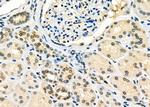
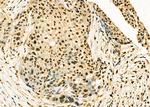
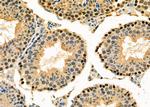

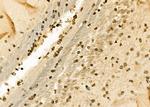
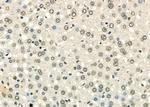
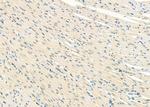
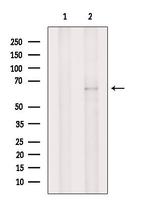
Product Details
PA5-102438
Species Reactivity
Host/Isotype
Class
Type
Immunogen
Conjugate
Form
Concentration
Purification
Storage buffer
Contains
Storage conditions
Shipping conditions
RRID
Product Specific Information
Antibody detects endogenous levels of total TAP2.
Target Information
The membrane-associated protein encoded by this gene is a member of the superfamily of ATP-binding cassette (ABC) transporters. ABC proteins transport various molecules across extra- and intra-cellular membranes. ABC genes are divided into seven distinct subfamilies (ABC1, MDR/TAP, MRP, ALD, OABP, GCN20, White). This protein is a member of the MDR/TAP subfamily. Members of the MDR/TAP subfamily are involved in multidrug resistance. This gene is located 7 kb telomeric to gene family member ABCB2. The protein encoded by this gene is involved in antigen presentation. This protein forms a heterodimer with ABCB2 in order to transport peptides from the cytoplasm to the endoplasmic reticulum. Mutations in this gene may be associated with ankylosing spondylitis, insulin-dependent diabetes mellitus, and celiac disease. Alternative splicing of this gene produces two products which differ in peptide selectivity and level of restoration of surface expression of MHC class I molecules.
For Research Use Only. Not for use in diagnostic procedures. Not for resale without express authorization.
References (0)
Bioinformatics
Protein Aliases: ABC transporter, MHC 2; Antigen peptide transporter 2; APT2; ATP dependent transport protein family member; ATP-binding cassette sub-family B member 3; ATP-binding cassette, sub-family B (MDR/TAP), member 3; Histocompatibility antigen modifier 2; Peptide supply factor 2; Peptide transporter involved in antigen processing 2; Peptide transporter PSF2; Peptide transporter TAP2; PSF-2; Really interesting new gene 11 protein; RING11; Transporter 2 ABC (ATP binding cassette); transporter 2 ATP-binding cassette sub-family B; transporter 2, ABC (ATP binding cassette); transporter 2, ATP-binding cassette, sub-family B (MDR/TAP)
Gene Aliases: ABC18; ABCB3; AI462429; APT2; Cim; D6S217E; Ham-2; Ham2; jas; MTP2; PSF-2; PSF2; RING11; Tap-2; TAP2; Y1
UniProt ID: (Human) Q03519, (Mouse) P36371, (Rat) P36372
Entrez Gene ID: (Human) 6891, (Mouse) 21355, (Rat) 24812

Performance Guarantee
If an Invitrogen™ antibody doesn't perform as described on our website or datasheet,we'll replace the product at no cost to you, or provide you with a credit for a future purchase.*
Learn more
We're here to help
Get expert recommendations for common problems or connect directly with an on staff expert for technical assistance related to applications, equipment and general product use.
Contact tech support
